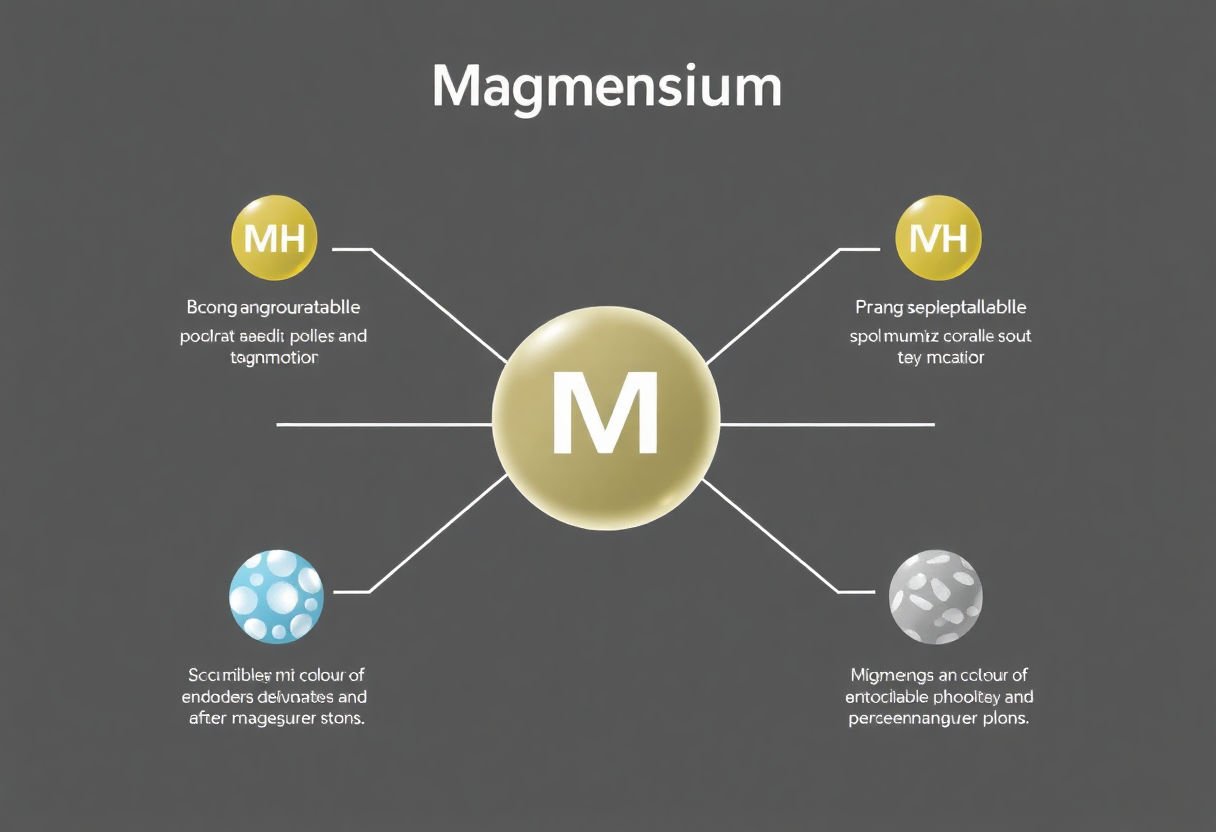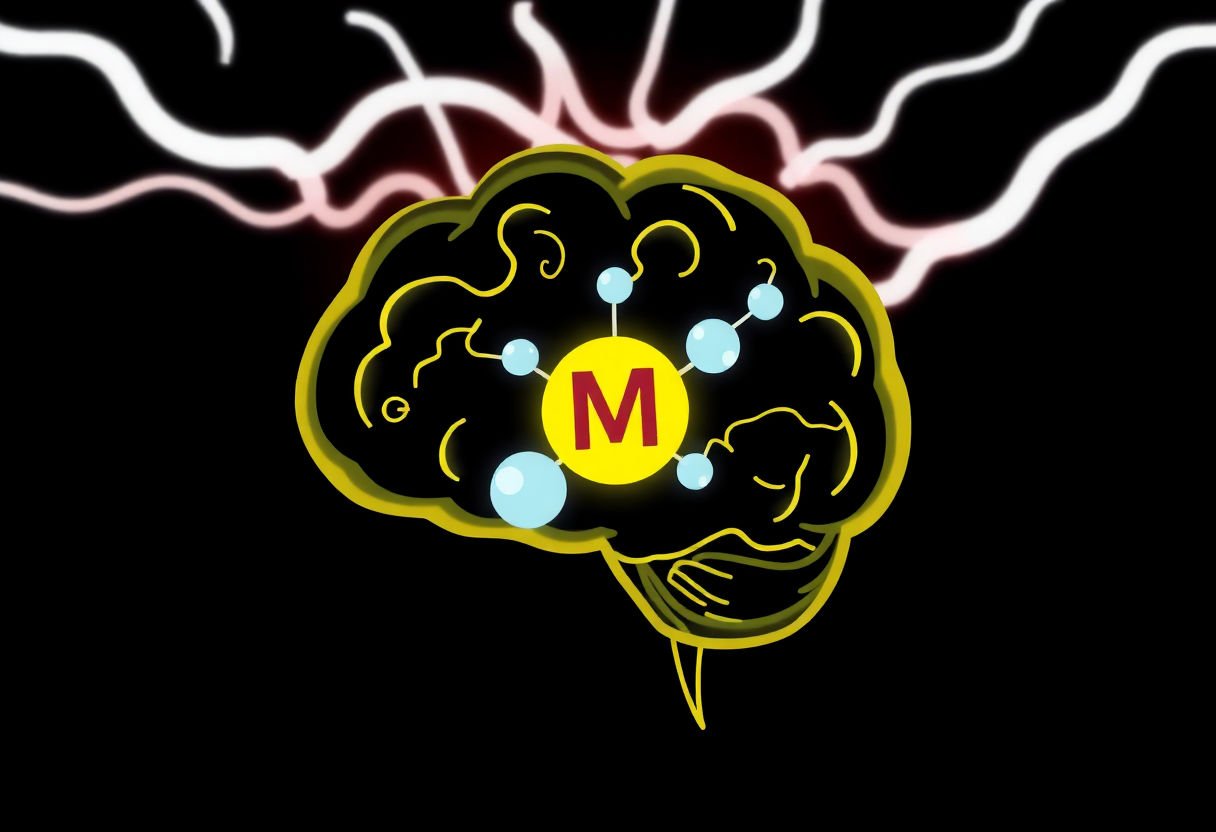In today’s fast-paced world, stress and anxiety are becoming increasingly prevalent, affecting millions of individuals daily. As people search for natural remedies to combat these challenges, the prospect of using a magnesium complex emerges as a promising solution. Not only does magnesium play a vital role in maintaining overall health, but research suggests its potential in alleviating stress and anxiety symptoms. This article delves into the components of magnesium complexes, their physiological roles, and the scientific links between magnesium levels and mental well-being, aiming to illuminate its benefits as a natural remedy designed for modern life’s pressures.
Key Takeaways
- Magnesium complex has emerged as a promising natural remedy to alleviate stress and anxiety, offering a safe alternative to pharmaceuticals.
- Scientific studies demonstrate a significant correlation between adequate magnesium levels and improved mental health, particularly in reducing symptoms of anxiety.
- Magnesium plays a crucial role in the body’s biochemical reactions, influencing both physical well-being and psychological stability.
- Symptoms of magnesium deficiency, such as fatigue and nervousness, can exacerbate stress and anxiety, highlighting the importance of maintaining optimal magnesium levels.
- Incorporating magnesium-rich foods and supplements into one’s diet can effectively combat deficiencies and support mental health, enhancing overall quality of life.
Understanding Magnesium Complex

Magnesium complex refers to a variety of magnesium compounds that combine magnesium with other substances to enhance absorption and efficacy in the body. Recognizing its importance, it’s essential to explore its forms and biological functions.
Composition and Forms
A magnesium complex typically includes magnesium bound to substances such as citrate, glycinate, or oxide, each with distinct properties:
- Magnesium Citrate: Known for high absorption and commonly used for its calming effects.
- Magnesium Glycinate: Offers high bioavailability and is gentle on the digestive system, ideal for reducing anxiety.
- Magnesium Oxide: Provides more elemental magnesium per dose, although it is less readily absorbed compared to other forms.
These forms cater to different physiological needs, making it important to choose the appropriate type of complex.
Biological Functions
Magnesium plays a pivotal role in over 300 biochemical reactions within the human body. It is crucial for:
- Regulating nerve and muscle function, maintaining normal heart rhythm.
- Supporting immune system health and ensuring strong bones.
- Facilitating protein synthesis and energy production.
Magnesium complexes enhance these biological functions, contributing to overall well-being.
Importance in Stress and Anxiety
The efficacy of magnesium complexes lies in their ability to modulate neurotransmitters that are critical for mood regulation. Magnesium influences brain receptors that manage synaptic transmission, which can be particularly beneficial for those facing stress and anxiety.
By understanding the diverse forms and functions of magnesium complexes, individuals can make informed decisions about their use to manage stress and anxiety effectively.
The Role of Magnesium in the Body

Magnesium is a vital mineral, often hailed as the unsung hero of the body, given its role in over 300 biochemical reactions that sustain life. It serves as a crucial element for energy production, as it aids in the transformation of food into usable energy, which is essential for the body’s proper functioning. Furthermore, magnesium plays a pivotal role in the synthesis of DNA, RNA, and proteins, supporting cellular health and repair.
In addition to these fundamental processes, magnesium is indispensable for maintaining a healthy nervous system. It contributes to the regulation of neurotransmitters, which are chemicals that transmit messages between nerve cells. This regulation is vital for maintaining a balanced mood and a calm mind, making magnesium integral to both physical and mental health.
Magnesium is also essential for the cardiovascular system, as it helps regulate blood pressure and maintain a steady heartbeat. By relaxing blood vessels, magnesium supports healthy circulation and aids in averting high blood pressure, a common issue that can escalate stress and anxiety.
Moreover, magnesium’s role in muscle function is crucial. It enables muscles to relax after contraction, which is important in preventing cramps and spasms, thereby supporting muscle health and flexibility. This function also extends to the muscles lining the digestive tract, assisting in bowel regularity.
A deficiency in magnesium can have profound effects on overall well-being, hence its importance in the diet cannot be overstated. Ensuring adequate magnesium intake through diet or supplementation can significantly contribute to maintaining optimized health and reducing stress and anxiety.
Connection Between Magnesium and Mental Health

Magnesium plays a crucial role in supporting mental health, with a growing body of scientific evidence highlighting its impact on stress and anxiety regulation. As an essential mineral involved in numerous biochemical reactions, magnesium influences neurotransmitter activity, particularly that of gamma-aminobutyric acid (GABA), a neurotransmitter known for its calming effects on the nervous system. Low magnesium levels can thus disrupt GABA function, potentially leading to heightened stress and anxiety.
Research indicates that magnesium deficiency is associated with an increased risk of developing anxiety and stress-related disorders. In one study, participants with adequate magnesium intake reported a notable decrease in stress levels compared to those who were deficient. This underscores the mineral’s role in providing a calming effect and promoting relaxation.
Moreover, magnesium’s involvement in reducing the secretion of cortisol, a hormone released in response to stress, further establishes its importance. Elevated cortisol levels are often linked to anxiety, making magnesium an important factor in managing stress responses.
Incorporating magnesium into one’s diet or as a supplement may thus offer therapeutic advantages, rooted in its ability to modulate brain function and endocrine responses. Given its impact on mental health, magnesium not only serves as a preventive measure against stress and anxiety but also acts as a complementary aid in treating these conditions naturally. By maintaining optimal magnesium levels, individuals may experience improved mood stability and enhanced emotional resilience.
Symptoms of Magnesium Deficiency

Magnesium deficiency, often termed hypomagnesemia, can manifest through various symptoms that may affect one’s physical and mental health. These symptoms, although subtle at first, can become more pronounced and significantly impact well-being if left unaddressed.
One of the early signs of magnesium deficiency is muscle cramps and spasms. Magnesium plays a critical role in muscle function, so its lack can lead to involuntary contractions and discomfort. Additionally, individuals may experience fatigue and weakness, a direct result of magnesium’s involvement in energy production.
Cognitively, a magnesium deficiency can contribute to increased stress and anxiety levels. Research suggests that low levels of magnesium can disrupt neurotransmitter function, potentially exacerbating symptoms of irritability and mood swings.
It is also important to note the impact on sleep patterns. Insomnia or sleep disturbances may occur as magnesium is necessary for maintaining neurotransmitters that promote relaxation and sleep. Moreover, magnesium deficiency can lead to headaches and migraines, as it influences neurotransmitter release and blood vessel constriction.
In some cases, severe magnesium deficiency may be linked to irregular heartbeats or arrhythmias. While more research is needed, this symptom highlights magnesium’s crucial role in cardiovascular health.
Digestive issues such as loss of appetite, nausea, and vomiting are additional indicators, though they tend to appear alongside other symptoms. Recognizing these signs early can aid in addressing magnesium deficiencies effectively, thereby mitigating stress and anxiety-related issues.
Benefits of Magnesium Complex for Stress and Anxiety

Magnesium complex plays a pivotal role in alleviating stress and anxiety, two common afflictions in today’s fast-paced world. This essential mineral is instrumental in regulating neurotransmitters, the brain’s chemical messengers, which significantly influence mood and stress response. By supporting serotonin function, the magnesium complex promotes a calming effect on the nervous system, helping to reduce both the symptoms and frequency of anxiety episodes.
Stress often leads to increased production of cortisol, known as the “stress hormone.” Magnesium aids in controlling cortisol levels, thus preventing a chronic state of heightened alertness. When chronic stress is left unregulated, it can lead to a host of issues, including anxiety and depression. The calming properties of magnesium help to mitigate these effects, providing a natural equilibrium to mental health.
Moreover, magnesium complex can reduce oxidative stress and inflammation, factors often heightened during periods of intense stress or anxiety. Its antioxidant properties protect brain cells from damage, contributing to a healthier, more resilient mental state.
Numerous studies have indicated that individuals experiencing anxiety may also have lower levels of magnesium in their body. Supplementing with a magnesium complex can therefore restore balance and support better mental health outcomes. By ensuring adequate magnesium intake, whether through supplements or natural food sources, individuals might experience not only a reduction in anxiety and stress but also improved sleep quality and a better overall mental outlook.
In conclusion, the magnesium complex offers numerous benefits for those grappling with stress and anxiety, providing a natural and effective way to enhance mental well-being.
Dosage and Safety Considerations
Incorporating a magnesium complex into your daily regimen demands attention to dosage and safety considerations to maximize benefits while minimizing risks. The recommended daily allowance (RDA) for magnesium varies by age, gender, and life stage. Generally, adult men should aim for 400-420 mg and women for 310-320 mg per day, with higher doses recommended during pregnancy.
When consuming a magnesium complex supplement, it is crucial to adhere to the product’s directions, as excessive intake may lead to adverse effects. Common side effects of overconsumption include diarrhea, nausea, and abdominal cramping. In extremely high doses, magnesium can cause serious health issues such as heart disturbances and lowered blood pressure.
Safety tips for supplementation include:
- Begin with the lowest recommended dose and gradually increase as tolerated.
- Consider dividing the dose across the day to improve absorption and reduce digestive discomfort.
- Consult a healthcare professional, particularly if you have existing health conditions or take medications that might interact with magnesium, such as diuretics, antibiotics, or heart medications.
While supplements can provide convenience, integrating magnesium-rich foods into your diet is equally essential for maintaining safe magnesium levels. Balance and moderation remain key when using magnesium complexes as part of your wellness strategy against stress and anxiety. Such precautions ensure an effective and safe approach to harnessing the potential benefits of magnesium.
Supplementing with Magnesium Complex
When considering magnesium supplementation, it is crucial to choose a magnesium complex that aligns with your health objectives and lifestyle. Various forms of magnesium supplements are available, each with unique characteristics and benefits.
Common types of magnesium complexes include:
-
Magnesium Citrate: Known for its high absorption rate, making it suitable for quickly alleviating magnesium deficiencies. It is often recommended for those who experience digestive issues, as it may have a mild laxative effect.
-
Magnesium Glycinate: Praised for its calming effects, magnesium glycinate is an excellent choice for individuals focusing on mental health benefits. It is less likely to cause digestive upset, making it a preferred option for long-term use.
-
Magnesium Oxide: While being less bioavailable, magnesium oxide contains a high concentration of elemental magnesium. It is often used for addressing heartburn and constipation rather than stress or anxiety.
When deciding on a supplement, consider the following factors:
-
Bioavailability: Some forms, like magnesium citrate and glycinate, offer higher absorption rates, crucial for maximizing efficacy.
-
Digestive Health: Opt for types with minimal gastrointestinal side effects if you have a sensitive stomach.
-
Specific Health Needs: Select a supplement form that targets your primary concerns, whether they are muscle relaxation, mental health, or digestive health.
Incorporating a magnesium complex into your routine may help manage stress and anxiety effectively. However, it’s important to consult with a healthcare professional to ensure the supplement fits your health profile, particularly if you are pregnant, nursing, or taking other medications. Always prioritize quality and transparency by choosing reputable brands that rigorously test their products for purity and potency.
Conclusion
Incorporating a magnesium complex into daily routines offers a promising natural remedy for stress and anxiety. By efficiently regulating stress-related pathways and mitigating symptoms of anxiety, magnesium supports mental wellness. As research deepens, the understanding of magnesium’s role in mental health continues to expand, highlighting its potential in comprehensive well-being strategies. For those experiencing stress, a mindful approach to diet and supplementation may yield significant benefits. Embracing magnesium’s power can lead to a calmer, more balanced life, encouraging individuals to explore this avenue under professional guidance for optimal results.
Frequently Asked Questions
What is a magnesium complex, and how does it differ from regular magnesium supplements?
A magnesium complex is a combination of different forms of magnesium designed to improve absorption and efficacy. Unlike standard supplements, which might contain only one type of magnesium, complexes offer a broader range of benefits that could potentially enhance stress and anxiety relief.
How does magnesium complex help in reducing stress and anxiety?
Magnesium complex aids in reducing stress and anxiety by supporting the production of neurotransmitters that regulate mood, such as serotonin. It also helps in balancing the body’s stress response system, promoting relaxation and calmness.
Are there any side effects associated with taking magnesium complex?
Most people tolerate magnesium complex well, but it can cause mild symptoms like gastrointestinal discomfort if taken in excessive amounts. It is important to adhere to recommended dosages to avoid potential side effects.
Can magnesium complex be taken with other medications?
Magnesium complex is generally safe, but it can interact with specific medications, such as antibiotics or blood pressure drugs. Consulting a healthcare provider before combining it with other medications is advisable.
How long does it typically take to see results when using magnesium complex for stress and anxiety?
The effects of magnesium complex can vary based on individual health conditions and dosage. Generally, some people may start noticing improvements in stress and anxiety levels within a few weeks of consistent use.
